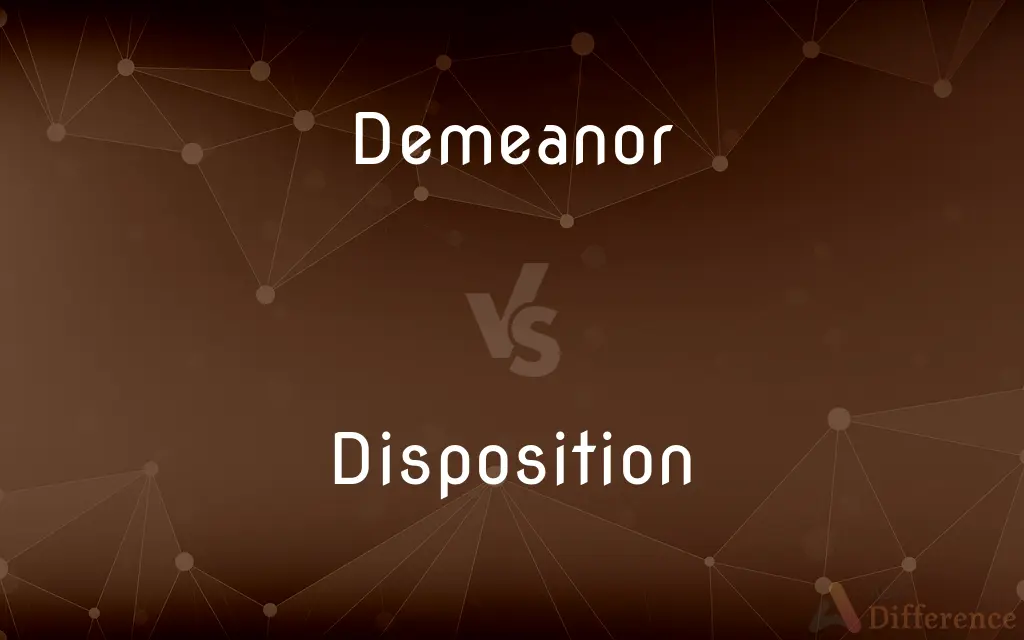Demeanor vs. Disposition — What's the Difference?
By Tayyaba Rehman & Urooj Arif — Updated on April 2, 2024
Demeanor refers to the outward behavior or bearing of a person, while disposition is about the inherent qualities of mind and character.

Difference Between Demeanor and Disposition
Table of Contents
ADVERTISEMENT
Key Differences
Demeanor is about how a person appears or behaves towards others, often observed through their actions or mannerisms. Whereas, disposition delves deeper into a person’s inherent qualities, including their tendencies, temperament, and overall attitude towards life. These two aspects, while related, focus on different layers of personality; demeanor is external, disposition is internal.
While demeanor can change depending on the situation or context, reflecting a person's adaptability or reaction to their surroundings, disposition is more consistent, underlying a person's habitual responses and feelings. Demeanor might be altered for social appropriateness, but disposition represents a person's natural inclination.
Demeanor is usually easier to assess by observers since it involves visible behaviors and expressions. On the other hand, disposition requires a deeper understanding of a person, often gained through prolonged interaction, to accurately evaluate.
In professional settings, demeanor plays a crucial role in making first impressions and can significantly influence how a person is perceived by colleagues and superiors. Meanwhile, disposition can affect long-term relationships and how well a person integrates into team dynamics or leadership roles.
While demeanor can be intentionally influenced or controlled to some extent, disposition is shaped by a combination of genetics, upbringing, and personal experiences, indicating it’s less malleable. This distinction highlights the complexity of human personality, where both visible actions and internal traits play integral roles.
ADVERTISEMENT
Comparison Chart
Definition
Outward behavior or bearing
Inherent qualities of mind and character
Observable
Yes, through actions and expressions
Requires deeper interaction to understand
Consistency
Can vary depending on context or social setting
Generally consistent across different situations
Influence
Can be intentionally modified or controlled
Shaped by genetics, experiences, and upbringing
Role in social interactions
Crucial for first impressions and outward social interactions
Influences long-term relationships and personal integration
Compare with Definitions
Demeanor
A calm and composed demeanor can ease tense situations.
Her calm demeanor reassured the team during the crisis.
Disposition
Someone’s disposition can be a guiding factor in their behavior and choices.
His cautious disposition made him think twice before acting.
Demeanor
A person’s demeanor is immediately noticeable in social interactions.
His friendly demeanor made him approachable.
Disposition
Disposition can influence a person’s approach to life and challenges.
Her resilient disposition helped her overcome many obstacles.
Demeanor
Demeanor can be deliberately altered to suit different social settings.
She adopted a professional demeanor for the interview.
Disposition
People with a gentle disposition are often seen as compassionate and kind.
His gentle disposition was evident in how he treated others.
Demeanor
An individual’s demeanor often reflects their current mood or feelings.
His cheerful demeanor brightened up the room.
Disposition
A sunny disposition makes a person generally cheerful and optimistic.
Her sunny disposition made her beloved by all.
Demeanor
Observing someone’s demeanor can provide clues about their personality.
Her reserved demeanor hinted at her introverted nature.
Disposition
A disposition towards learning is beneficial in both personal and professional growth.
Her disposition towards continuous learning earned her many opportunities.
Demeanor
The way in which a person behaves; deportment.
Disposition
A disposition is a quality of character, a habit, a preparation, a state of readiness, or a tendency to act in a specified way that may be learned. The terms dispositional belief and occurrent belief refer, in the former case, to a belief that is held in the mind but not currently being considered, and in the latter case, to a belief that is currently being considered by the mind.
Demeanor
(American spelling) The social, non-verbal behaviours (such as body language and facial expressions) that are characteristic of a person.
The man's demeanor made others suspicious of his intentions.
A confident demeanor is crucial for persuading others.
Disposition
A person's inherent qualities of mind and character
He has the disposition of a saint
Your sunny disposition has a way of rubbing off on those around you
Demeanor
Management; treatment; conduct.
God commits the managing so great a trust . . . wholly to the demeanor of every grown man.
Disposition
The way in which something is placed or arranged, especially in relation to other things
The plan shows the disposition of the rooms
Demeanor
Behavior; deportment; carriage; bearing; mien.
His demeanor was singularly pleasing.
The men, as usual, liked her artless kindness and simple refined demeanor.
Disposition
The power to deal with something as one pleases
If Napoleon had had railways at his disposition, he would have been invincible
Demeanor
(behavioral attributes) the way a person behaves toward other people
Disposition
One's usual mood; temperament
A sweet disposition.
Disposition
A habitual inclination; a tendency
A disposition to disagree.
Disposition
A physical property or tendency
A swelling with a disposition to rupture.
Disposition
Arrangement, positioning, or distribution
A cheerful disposition of colors and textures.
A convoy oriented into a north-south disposition.
Disposition
An act of disposing; a bestowal or transfer to another.
Disposition
The power or liberty to control, direct, or dispose
The funds that were put at her disposition.
Disposition
The way in which something or someone is disposed or disposed of (in any sense of those terms); thus:
Disposition
Control over something, or the results produced by the exercise of such control; thus:
Disposition
Tendency or inclination under given circumstances.
I have little disposition now to do as you say.
Salt has a disposition to dissolve in water.
Disposition
Temperamental makeup or habitual mood.
She has a sunny disposition.
He has such a foul disposition.
Disposition
To remove or place in a different position.
Disposition
The act of disposing, arranging, ordering, regulating, or transferring; application; disposal; as, the disposition of a man's property by will.
Who have received the law by the disposition of angels.
The disposition of the work, to put all things in a beautiful order and harmony, that the whole may be of a piece.
Disposition
The state or the manner of being disposed or arranged; distribution; arrangement; order; as, the disposition of the trees in an orchard; the disposition of the several parts of an edifice.
Disposition
Tendency to any action or state resulting from natural constitution; nature; quality; as, a disposition in plants to grow in a direction upward; a disposition in bodies to putrefaction.
Disposition
Conscious inclination; propension or propensity.
How stands your disposition to be married?
Disposition
Natural or prevailing spirit, or temperament of mind, especially as shown in intercourse with one's fellow-men; temper of mind.
His disposition led him to do things agreeable to his quality and condition wherein God had placed him.
Disposition
Mood; humor.
As I perchance hereafter shall think meetTo put an antic disposition on.
Disposition
Your usual mood;
He has a happy disposition
Disposition
The act or means of getting rid of something
Disposition
An attitude of mind especially one that favors one alternative over others;
He had an inclination to give up too easily
A tendency to be too strict
Disposition
A natural or acquired habit or characteristic tendency in a person or thing;
A swelling with a disposition to rupture
Common Curiosities
Is it easier to change one's demeanor or disposition?
It's easier to change one's demeanor since it involves external behaviors rather than internal traits.
What is the main difference between demeanor and disposition?
Demeanor refers to outward behavior, while disposition is about inherent character traits.
Is disposition influenced by nature or nurture?
Disposition is influenced by both genetics (nature) and personal experiences (nurture).
Do demeanor and disposition play a role in leadership?
Yes, both affect how leaders are perceived and their ability to inspire or manage teams.
Is it possible for someone to have a mismatch between their demeanor and disposition?
Yes, individuals may present a demeanor that doesn’t fully align with their underlying disposition.
Can someone's demeanor accurately reflect their disposition?
Not always, as demeanor can be controlled or adapted, whereas disposition is more consistent and deeply ingrained.
How can understanding someone’s disposition benefit personal relationships?
It allows for deeper connections by understanding their inherent tendencies and how they may react in various situations.
Can a professional setting influence a person’s demeanor?
Yes, professional environments often require individuals to adopt a certain demeanor suitable for the setting.
How can one assess another’s disposition?
Through prolonged interaction and observation of their consistent behavior and reactions.
Can stress affect a person's demeanor and disposition differently?
Yes, stress might temporarily alter someone’s demeanor more noticeably than their disposition.
How do demeanor and disposition contribute to someone’s overall personality?
They are components of personality, with demeanor reflecting external expressions and disposition indicating underlying qualities.
Can a person’s disposition change over time?
While it's more consistent, life experiences and personal growth can influence one's disposition.
How do demeanor and disposition influence social dynamics?
They affect how individuals interact, form first impressions, and maintain long-term relationships.
Why is understanding both demeanor and disposition important in psychology?
It helps in comprehensively understanding human behavior and personality.
How does culture affect demeanor and disposition?
Cultural norms and values can shape both how individuals behave outwardly and their internal qualities.
Share Your Discovery

Previous Comparison
Disgust vs. Loathing
Next Comparison
Experienced vs. SkillfulAuthor Spotlight
Written by
Tayyaba RehmanTayyaba Rehman is a distinguished writer, currently serving as a primary contributor to askdifference.com. As a researcher in semantics and etymology, Tayyaba's passion for the complexity of languages and their distinctions has found a perfect home on the platform. Tayyaba delves into the intricacies of language, distinguishing between commonly confused words and phrases, thereby providing clarity for readers worldwide.
Co-written by
Urooj ArifUrooj is a skilled content writer at Ask Difference, known for her exceptional ability to simplify complex topics into engaging and informative content. With a passion for research and a flair for clear, concise writing, she consistently delivers articles that resonate with our diverse audience.
















































